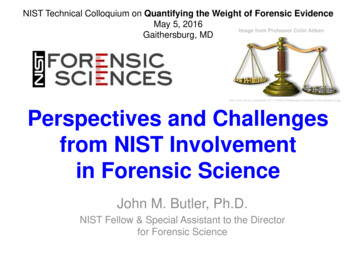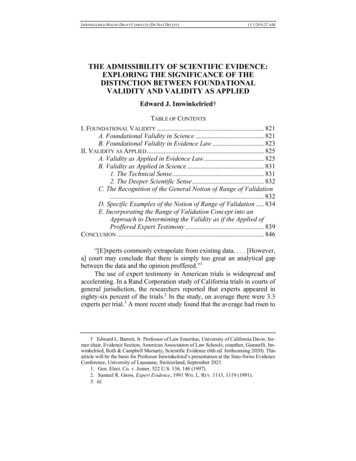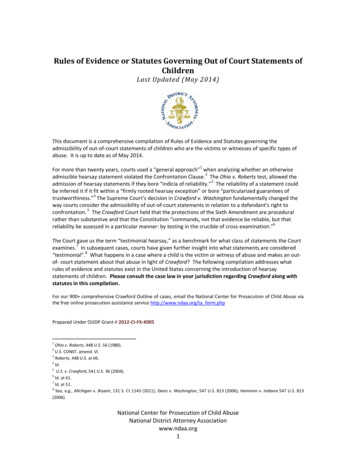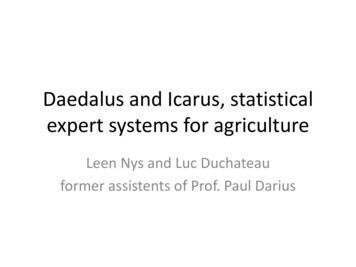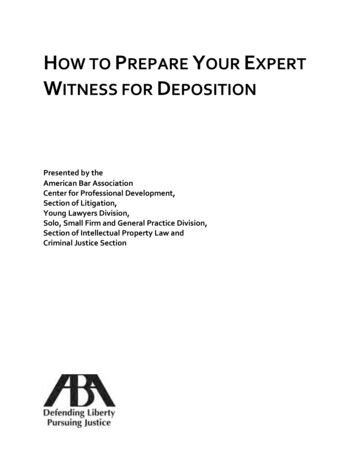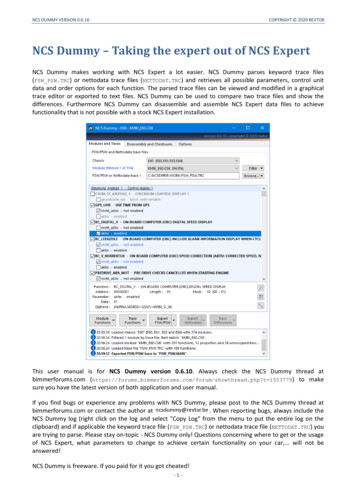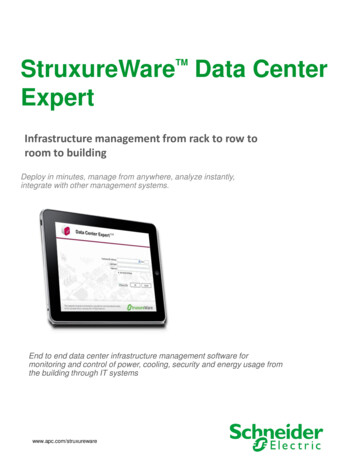
Transcription
The Law CommissionConsultation Paper No 190THE ADMISSIBILITY OF EXPERTEVIDENCE IN CRIMINAL PROCEEDINGSIN ENGLAND AND WALESA New Approach to the Determination ofEvidentiary ReliabilityA Consultation Paper
ii
THE LAW COMMISSION – HOW WE CONSULTAbout the Law CommissionThe Law Commission was set up by section 1 of the Law Commissions Act 1965 for the purpose of promoting thereform of the law.The Law Commissioners are: The Rt Hon Lord Justice Etherton (Chairman), Professor Elizabeth Cooke, Mr DavidHertzell, Professor Jeremy Horder and Kenneth Parker QC.The Chief Executive of the Law Commission is: Mr Mark Ormerod.Topic of this consultationThis consultation paper addresses the problems associated with the admissibility and understanding of expertevidence in criminal trials. We believe the current approach to the admissibility of expert evidence in criminal trials is inneed of reform. We would welcome views on our provisional proposals.This paper is the first Law Commission publication relating to this area of the law. It follows calls for reform from anumber of scientists, practitioners and legal academics and from the House of Commons’ Science and TechnologyCommittee in its Seventh Report, Forensic Science on Trial (2004-2005) HC 96-1. The Committee recommended thatthe Forensic Science Advisory Council, judges, scientists and other key players in the criminal justice system shouldwork together to develop a new test for determining the admissibility of expert evidence in criminal proceedings.We have already discussed our provisional proposals with a number of academics, legal professionals and theForensic Science Regulator. Our consultation paper has also been reviewed by HHJ Jeremy Roberts QC.Scope of this consultationThe purpose of this consultation is to generate responses to our provisional proposals with a view to makingrecommendations for reform to Parliament. Our proposals are set out in Part 6. Our key questions for consultation areset out in paragraphs 6.78 to 6.83.Geographical scopeThis consultation paper refers to the law of England and Wales.Impact assessmentAn impact assessment, setting out the potential impact of our proposed reforms, is included as Appendix C. Keyquestions for consultation regarding this assessment can be found in paragraphs C.59 to C.62 of Appendix C (and inparagraphs 6.84 to 6.88 of the consultation paper itself).Duration of the consultationWe invite responses from 7 April to 7 July 2009.How to respondPlease send your responses either –By email to:expert.evidence@lawcommission.gsi.gov.uk;By post to:Raymond Emson, Law Commission, Steel House, 11 Tothill Street, London SW1H 9LJTel: 020 3334 0272 / Fax:Online at:020 3334 0201;ORORhttp://www.lawcom.gov.uk/lc-forumIf you send your comments by post, it would be helpful if, whenever possible, you could send them to uselectronically as well (for example, on CD or by email to the above address, in any commonly used format).After the consultationIn the light of the responses we receive, we will decide our final recommendations and we will present them toParliament. We hope to publish our final report in 2010. It will be for Parliament to decide whether to approve anychanges to the law.Code of PracticeWe are a signatory to the Government’s Code of Practice on Consultation and carry out our consultations inaccordance with the Code criteria (set out on the next page).Freedom of informationWe will treat all responses as public documents in accordance with the Freedom of Information Act and we may attributecomments and include a list of all respondents' names in any final report we publish. If you wish to submit a confidentialresponse, you should contact us before sending the response. PLEASE NOTE – We will disregard automatic confidentialitystatements generated by an IT system.Availability of this consultation paperYou can view/download it free of charge on our website at: http://www.lawcom.gov.uk/docs/cp190.pdf.iii
CODE OF PRACTICE ON CONSULTATIONmTHE SEVEN CONSULTATION CRITERIACriterion 1:When to consultFormal consultation should take place at a stage when there is scope to influence the policy outcome.Criterion 2:Duration of consultation exerciseConsultations should normally last for at least 12 weeks with consideration given to longer timescaleswhere feasible and sensible.Criterion 3:Clarity and scope of impactConsultation documents should be clear about the consultation process, what is being proposed, thescope to influence and the expected costs and benefits of the proposals.Criterion 4:Accessibility of consultation exercisesConsultation exercises should be designed to be accessible to, and clearly targeted at, those people theexercise is intended to reach.Criterion 5:The burden of consultationKeeping the burden of consultation to a minimum is essential if consultations are to be effective and ifconsultees’ buy-in to the process is to be obtained.Criterion 6:Responsiveness of consultation exercisesConsultation responses should be analysed carefully and clear feedback should be provided toparticipants following the consultation.Criterion 7:Capacity to consultOfficials running consultations should seek guidance in how to run an effective consultation exercise andshare what they have learned from the experience.mCONSULTATION CO-ORDINATORThe Law Commission’s Consultation Co-ordinator is Correna Callender.mmYou are invited to send comments to the Consultation Co-ordinator about the extent to which thecriteria have been observed and any ways of improving the consultation process.Contact:Correna Callender, Consultation Co-ordinator, Law Commission, Steel House, 11 TothillStreet, London SW1H 9LJ – Email: correna.callender@lawcommission.gsi.gov.ukFull details of the Government’s Code of Practice on Consultation are available on the BERRwebsite at http://www.berr.gov.uk/files/file47158.pdf.iv
THE LAW COMMISSIONTHE ADMISSIBILITY OF EXPERT EVIDENCE INCRIMINAL PROCEEDINGS IN ENGLAND ANDWALESCONTENTSPART 1: INTRODUCTIONThe scope of this paperRelated matters beyond the scope of this paperThe structure of this paperParagraphPage1.11.121.211147PART 2: THE PROBLEMS8PART 3: THE COMMON LAW AND CALLS FOR REFORM18PART 4: PROPOSALS FOR REFORMIntroductionOption 1: Exclusionary discretion without guidanceOption 2: Exclusionary discretion with guidanceOption 3: Consensus amongst experts (deference)Option 4: Judicial assessment of evidentiary reliabilityRule 702 and scientific evidenceThe scientific methodPeer review and publicationRule 702 and non-scientific evidenceThe judicial application of a validity-basedadmissibility 30333337404143PART 5: CONCLUSIONS47PART 6: PROPOSALS FOR CONSULTATIONProposal 1: A “gate-keeping” role and validity-basedadmissibility testStage (a): principles, methodology and assumptionsScientific expert evidenceExperience-based expert evidence6.448496.206.256.34525356v
Stage (b): application to the factsStage (c): the expert’s reasoningReviewing the ruling on appealAdditional safeguardsProposal 2: The onus of persuasionAssistance from court-appointed assessorsEducation and AccreditationEducationAccreditationProvisional proposals and questionsImpact assessment: questions for .726.726.756.786.845858595961646666676869APPENDIX A: RELEVANCE AND ADMISSIBILITY70APPENDIX B: PROCEDURE74APPENDIX C: IMPACT ASSESSMENT77APPENDIX D: COMMON SOURCES OF UNRELIABILITY INSCIENTIFIC EVIDENCE90vi
PART 1INTRODUCTIONTHE SCOPE OF THIS PAPER1.1In this consultation paper we address the problems associated with the admissibilityand understanding of expert evidence in criminal proceedings. Of particularimportance in this context is the approach which should be adopted for scientific, orpurportedly scientific, evidence tendered for admission in Crown Court jury trials.11.2Three factors relevant to determining the admissibility of expert opinion evidencewere conveniently summarised by King CJ in the Australian case of Bonython.2These factors, which are also part of the common law in England and Wales,3 are:(1)“whether the subject matter of the opinion is such that a person withoutinstruction or experience in the area of knowledge or human experiencewould be able to form a sound judgment on the matter without theassistance of a witness possessing special knowledge or experience inthe area”;4(2)“whether the subject matter of the opinion forms part of a body ofknowledge or experience which is sufficiently organized or recognized tobe accepted as a reliable body of knowledge or experience, a specialacquaintance with which by the witness would render his opinion ofassistance to the court”;5 and1In criminal proceedings in a magistrates’ court or the Crown Court, the tribunal of fact – theindividual(s) responsible for determining disputed issues of fact – may be: a single district judgein a magistrates’ court; a bench of lay magistrates; lay magistrates and a professional CrownCourt judge (for a re-hearing on appeal against a conviction in a magistrates’ court); or, for trialson indictment, a Crown Court jury. In this paper we generally refer to “the jury” rather than the“tribunal of fact” for ease of exposition and because it is in jury trials that the problemsassociated with expert evidence are most likely to arise. The individual in the Crown Court whois responsible for determining whether evidence is admissible and, if so, whether it oughtnevertheless to be kept from the jury, is the trial judge (the tribunal of law).2(1984) 38 SASR 45, 46 to 47 (Supreme Court of South Australia).3The Court of Appeal has cited Bonython on a number of occasions, see, eg: G [2004] EWCACrim 1240, para 15; Luttrell [2004] EWCA Crim 1344, para 32; Dudley [2004] EWCA Crim 3336,para 30; and Harris [2005] EWCA Crim 1980, para 270.4This accords with the leading English case of Turner [1975] QB 834, 841: “An expert’s opinionis admissible to furnish the court with information which is likely to be outside the experienceand knowledge of a judge or jury. If on the proven facts a judge or jury can form their ownconclusions without help, then the opinion of an expert is unnecessary.”5In broad terms this factor requires that the “subject matter of the [expert witness’s] opinion”should be sufficiently reliable to justify the admission before the jury of an expert opinionfounded on it.1
(3)“whether the witness has acquired by study or experience sufficientknowledge of the subject to render his opinion of value in resolving theissues before the court”.61.3A fourth requirement is that that the expert must be capable of providing an impartialopinion,7 in recognition of the fact that an expert’s overriding duty is to the court andnot the party calling him or her to testify.81.4Our purpose in publishing this consultation paper is to set out and elicit feedback onproposals which relate to, but are slightly broader than, the second of the fourrequirements listed above. We do not address the other factors relevant to thedetermination of admissibility.1.5In line with the position at common law, we accept that expert evidence should beadmissible in criminal proceedings only if it is sufficiently reliable to be consideredby the jury. In this paper, however, we make proposals for a new approach to thedetermination of evidentiary reliability of expert evidence in criminal proceedings.This has required us to address two separate, but related, issues:(1)the fundamental question whether the subject matter of the expert’sevidence is sufficiently organised or recognised to “be accepted as areliable body of knowledge or experience” (the second of the fourrequirements listed above); and(2)the case-specific question whether the particular expert witness hasproperly drawn from that “reliable body of knowledge or experience” toprovide a reliable opinion on the factual issue(s) the jury must resolve.96The witness must have sufficient knowledge and experience to justify having his or her opinionplaced before the jury as an expert opinion on the relevant matter. As a general rule, formalqualifications are unnecessary to be competent as an expert witness (see, eg, Silverlock [1894]2 QB 766 and Hodges [2003] EWCA Crim 290). However, as a matter of practical reality, awitness is unlikely to be regarded as an expert for some fields (such as medicine) unless he orshe has relevant qualifications as well as experience. In Robb (1991) 93 Cr App R 161,Bingham LJ suggested that the opinion evidence of an amateur psychologist would beinadmissible.7Field v Leeds City Council [2001] 2 CPLR 129.8For criminal proceedings the expert’s overriding duty to provide an “objective, unbiased opinion”is now explicitly set out in rule 33.2 of the Criminal Procedure Rules 2005. There has beenconcern for some time, however, that some experts may be tempted to provide an opinionwhich favours his or her paymaster. See, eg, the view of Professor Graham Zellick, whenChairman of the Criminal Cases Review Commission, that high fees tempt experts to giveunequivocal opinions just to secure their next case (The Times, 30 November 2004).9We refer to expert opinion evidence, in line with the approach conventionally adopted whenreferring to an expert witness’s testimony on matters within his or her field. We appreciate,however, that an expert witness may sometimes provide non-opinion expert evidence. Forexample, an expert on a particular machine may be permitted to give evidence on how itoperates, if relevant to an issue in the proceedings.2
1.6We focus primarily on the first of these two issues, but also address the secondissue in our proposals.1.7We explain in Parts 2 and 3 of this paper why the present approach to thedetermination of evidentiary reliability of expert evidence, with regard to the “reliablebody of knowledge or experience” condition, is proving to be problematic and why,accordingly, there have been calls for reform.1.8The other three rules governing the admissibility of expert evidence are relativelyuncontroversial.10 They may of course give rise to occasional problems in theirapplication – for example, it may be difficult to determine whether a particularwitness has sufficient knowledge and experience to be competent to provide anexpert opinion or whether an expert witness is providing an unbiased opinion – butwe believe the rules themselves are fundamentally sound and readilycomprehensible. In our view, these rules do not need to be altered (but we wouldwelcome consultees’ views on whether we should use the opportunity provided bythis project to consider codifying them in primary legislation).1.9Once we have explored the problems associated with the current approach to theadmissibility of expert evidence, in Parts 2 and 3, we go on to consider:1.10(1)whether reform is desirable or necessary; and, if so,(2)whether such reform should comprise:(a)the creation of a new statutory admissibility test for expertevidence (to supplement the other aspects of the presentcommon law test);11 and/or(b)the introduction of statutory or other guidance to assist trialjudges in determining whether expert evidence is sufficientlyreliable to be placed before a jury.Our view is that reform is needed. We provisionally propose:(1)that there should be a new statutory test for determining theadmissibility of expert evidence in criminal proceedings, whichwould apply whether the evidence is tendered by the prosecution orby the accused;10The rules described above in para 1.2(1) and (3) and in para 1.3.11Above. It should also be noted that any manifestly unreliable evidence tendered by theprosecution can at present be excluded at common law or by the application of s 78(1) of thePolice and Criminal Evidence Act 1984; see, eg: Clarke [1995] 2 Cr App R 425, 432; Lawson[1998] Criminal Law Review 883, 884; and Luttrell [2004] EWCA Crim 1344, para 34.3
1.11(2)this new test would provide that expert evidence is admissible onlyif the court12 is satisfied that the evidence is sufficiently reliable tobe admitted;13 and(3)in determining whether or not the test is satisfied the court would inall cases have to refer to a statutory list of guidelines forassistance.For Crown Court trials on indictment, we also address, and ask consultees toconsider, the question whether the trial judge should exceptionally be able to callupon a court-appointed assessor to provide him or her with assistance whenapplying our proposed test.RELATED MATTERS BEYOND THE SCOPE OF THIS PAPER1.12It is worth repeating that we are focusing on the admissibility of expert evidence,and only one aspect of the admissibility test set out in Bonython.14 We do nottherefore make proposals which would address procedural difficulties which maycurrently be associated with the tendering of expert evidence in criminalproceedings, that is, matters properly falling within the remit of the CriminalProcedure Rules Committee.151.13Given the relatively narrow focus of this particular reform project, we also believe itis important to state at the outset that, taken in isolation, our proposals for reformingthe law governing the admissibility of expert evidence would not provide a panacea.1.14We believe that our proposals are likely to be most effective, as a mechanism forensuring that only reliable evidence is placed before criminal juries, if they arecomplemented by extraneous measures to form a broader context of change. Wesay “extraneous measures” because, save for one problem, which the Governmenthas already decided to address,16 the measures we have in mind would not involveany reform of the law of criminal evidence.12The Crown Court trial judge. In a magistrates’ court, the test would be applied by a professionaldistrict judge or by a bench of lay magistrates acting on advice provided by their legal adviser.13The admissibility rule itself would effectively restate the common law rule. However, we believethat a new statutory test would ensure that the question is properly addressed by the advocatesand trial judge and that a reasoned decision is given on whether the evidence is admissible orinadmissible.14(1984) 38 SASR 45, 46 to 47; see para 1.2 above.15For the current rules relating to expert evidence in the Criminal Procedure Rules, see Part 24(covering the disclosure of expert evidence) and Part 33 (covering duties, experts’ reports, prehearing discussions and single joint experts).16The problem is the absence of any obligation on the accused to make pre-trial disclosure of thenames and addresses of his or her prospective expert witnesses. This problem will be resolvedonce s 35 of the Criminal Justice Act 2003 comes into force.4
1.15We believe that the following measures would complement the proposals we aremaking and that our proposals, in tandem with such measures, would solve many ofthe problems associated with expert evidence in criminal proceedings:(1)a more robust approach to the accreditation and regulation of expertwitnesses, whether called by the prosecution or the defence;17(2)a disclosure process which would allow all parties to screen theiropponents’ expert witnesses in advance of the trial to assess, forexample, their qualifications, relevant experience, extraneous conductand whether or not they are accredited by a reputable body;18 and(3)an enhanced training curriculum for new judges and junior lawyers whichwould:(a)require them to have an understanding of the factors to be bornein mind when assessing the viability of a scientific (or purportedlyscientific) hypothesis; and(b)equip them to intervene effectively if an expert witness presentshis or her evidence in an inappropriate way or strays from his orher legitimate field of expertise or provides an opinion predicatedon unsound assumptions.17A Forensic Science Regulator (FSR) appointed by the Home Secretary now has the task ofsetting and monitoring quality standards for the use of forensic science in the Criminal JusticeSystem. This involves: identifying the need for new or improved quality standards; leading onthe development of standards; and providing advice and guidance so that service providers areable to demonstrate compliance with standards. The FSR has recently proposed, amongstother things, that forensic providers, including expert witnesses, should be accredited by arecognised independent body to accepted standards and that they should be able todemonstrate, through an independent process, their ongoing competence and development. Atpresent the FSR’s remit extends only to evidence tendered by the prosecution, but it is feasiblethat this could be extended, by legislation, to cover defence experts. In any event, appropriateaccreditation may in time become a criterion for determining whether the Legal ServicesCommission makes public funds available to pay for an expert witness called by the defence.18This problem is in the process of being resolved. When s 6D of the Criminal Procedure andInvestigations Act 1996 comes into force, the accused will have to make pre-trial disclosure ofthe name and address of all persons he or she has instructed “with a view to his providing anyexpert opinion for possible use as evidence at the trial”. (Section 6D has been inserted into the1996 Act by s 35 of the Criminal Justice Act 2003.) Rule 24.1(1) of the Criminal ProcedureRules 2005 already places the prosecution and accused under an obligation to “furnish theother party or parties and the court with a statement in writing of any finding or opinion which[the party] proposes to adduce by way of [expert] evidence”. For the prosecution’s disclosureobligations in relation to their “unused” evidence, including factors affecting the reliability of theirexpert witnesses, see ss 3, 4 and 7A of the Criminal Procedure and Investigations Act 1996and, in particular, paras 8 to 12 of the Attorney General’s Guidelines on Disclosure, April 2005(the guidelines can be found at doc).5
1.16We believe that measures of this sort would go some way towards ensuring that ourproposed rules, and the other admissibility rules,19 would be applied more effectivelyin practice. For example, a system of expert witness regulation and accreditation, intandem with a more robust pre-trial disclosure process, would prevent charlatansand biased experts from being permitted to testify as expert witnesses.201.17It is fair to say, however, that the problems associated with expert evidence cannever be entirely resolved. Scientific knowledge is continuously advancing as moreempirical research is undertaken, so it is inevitable that some hypotheses will cometo be modified or discarded, that expert testimony based on any such hypothesiswill subsequently come to be regarded as unreliable and that this will have abearing on the legitimacy of convictions (and, to a lesser extent, acquittals) foundedon such testimony.1.18This problem exists not because of any failings on the part of scientific experts ortheir methodology but because of the very nature of the scientific method. As theCourt of Appeal noted in Cannings,21 on occasion it will have to be accepted that“what was confidently presented to the jury as virtually overwhelming expertevidence providing the necessary proof should now be approached with adegree of caution”.221.19A similar point was made, very recently, in the case of Holdsworth:23Conclusions of experts necessarily involve a process of induction, that isinferring conclusions from given facts based on other knowledge andexperience. But particular caution is needed where the scientific knowledge ofthe process or processes involved is or may be incomplete. As knowledgeincreases, today’s orthodoxy may become tomorrow’s outdated learning.Special caution is also needed where expert opinion evidence is not just relied24upon as additional material to support a prosecution but is fundamental to it.1.20However, we believe that our proposals, if adopted, would ensure that convictionsand acquittals would be founded on expert evidence only if the hypothesis andmethodology underpinning that evidence can be shown to be trustworthy. Wepropose that “orthodoxy” which cannot be shown to be trustworthy should not beadmissible.19The three rules described above in para 1.2(1) and (3) and in para 1.3.20Notorious examples of fraudulent “expert” witnesses who have been convicted in recent yearsinclude Godwin Onubogu (bogus medical doctor, convicted in 1998), Barian Baluchi (boguspsychiatrist, convicted in 2005) and Gene Morrison (bogus psychologist, convicted in 2007).21[2004] EWCA Crim 1.22Above, para 156.23[2008] EWCA Crim 971.24Above, para 57.6
THE STRUCTURE OF THIS PAPER1.21In Part 2 we explain the problems associated with expert evidence in Crown Courtjury trials, with reference to some recent decisions of the Court of Appeal.1.22In Part 3 we explain the aspect of the present common law approach to theadmissibility of expert evidence which reflects the requirement of the secondBonython criterion.25 We then go on to explain why this approach has proved to bean unsatisfactory mechanism for dealing with the problems we have identified.1.23In Part 4 we address a number of options for reforming the law so as to provide amore principled, and we suggest better, approach to the determination ofadmissibility of expert evidence in criminal proceedings.1.24In Parts 5 and 6 we set out our conclusions and explain our provisional proposals.1.25At the end of Part 6 we summarise our provisional proposals and set out a numberof specific questions we would like our consultees to consider.1.26In Appendix A we summarise a common law test which could, in theory, be appliedto render any evidence, including expert evidence, inadmissible as a matter of law.1.27In Appendix B we describe the current procedural framework into which ourproposals for reform would fit.1.28In Appendix C we address the likely impact of our proposals, if carried forward intolaw. We believe it is important that the social and economic impact of ourprovisional proposals is assessed, as this may have a bearing, in practical terms, onthe desirability, and therefore the likelihood, of our proposed reforms beingimplemented. Appendix C therefore summarises the different options we haveconsidered and then sets out the main costs and benefits associated with eachoption, on the evidence which is currently available. We also ask a number ofquestions with a view to eliciting more evidence relevant to our assessment so that,when we publish our final recommendations, we are in a position to provide a moreaccurate picture. These questions are also set out at the end of Part 6.1.29In Appendix D we describe some aspects of “poor science” the trial judge shouldlook out for when applying our proposed test.25Paragraph 1.2(2) above.7
PART 2THE PROBLEMS2.1It has long been accepted that specialised areas of knowledge, where relevant tothe determination of a disputed factual issue, should be explained to the jury byexperts in the field because the jury can be presumed to be unfamiliar with suchareas. This does something to ensure that the jury does not draw erroneousinferences from the evidence before it and that it is properly equipped to determinehow much weight, if any, to give to the evidence to which the expertise relates.12.2It is therefore trite law that witnesses having a relevant degree of expertise arecompetent to testify on the factual matters which lie within their specialisation, toguide or assist the jury in its resolution of the disputed factual issues.2 Indeed, theadduction of expert evidence is sometimes obligatory in criminal proceedings.32.3The theoretical position is that experts are expected simply to educate the jury, topass on the relevant aspects of their knowledge and expertise so that the jury itselfcan properly assess the evidence to which it relates. This no doubt holds true forsome of the less complex areas of specialised knowledge. However, in cases wherethe field of expertise is particularly difficult to comprehend (for example, because anunderstanding of the field requires a preliminary understanding of advancedmathematics or statistics) it is no doubt fair to say that the jury may simply defer tothe expert’s own knowledge and opinion when considering how to resolve thedisputed factual issue or issues to which the expertise pertains.42.4An expert witness’s opinion may therefore be extremely persuasive in terms of theassistance it can provide. The degree to which the expert’s evidence will bepersuasive, and therefore the likelihood that the jury will defer to the expert withoutforming an opinion of its own, is of course likely to depend on the complexity of thefield.2.5This is not necessarily a bad thing if the expert’s evidence is reliable, given that itwould be quite impracticable to provide the jury with sufficient expertise of its own toavoid the possibility of deference.1The test for determining admissibility is summarised in paras 1.2 and 1.3 above.2Expert evidence is also admissible to help the judge (or magistrates) to decide questions of lawsuch as: whether a would-be witness is competent to give evidence and, if so, whether he or sheshould give evidence on oath (Youth Justice and Criminal Evidence Act 1999, ss 54(5) and 55(6));the question of “required capability” for hearsay evidence (Criminal Justice Act 2003, s 123(4)(b));and whether a “special measures direction” should be made, varied or discharged (see CriminalProcedure Rules 2005, r 29.8).3Expert psychiatric evidence is necessary if, eg, diminished responsibility or insanity has beenraised; see Dix (1981) 74 Cr App R 306 and ss 1 and 2 of the Criminal Procedure (Insanity andUnfitness to Plead) Act 1991.4See generally Roberts and Zuckerman, Criminal Evidence (Oxford, 2004) pp 292 to 296.8
2.6However, the possibility or likelihood of jury deference in relation to complex fields ofknowledge gives r
1.5 In line with the position at common law, we accept that expert evidence should be admissible in criminal proceedings only if it is sufficiently reliable to be considered by the jury. In this paper, however, we make proposals for a new approach to the determination of evidentiary reliability of expert evidence in criminal proceedings.




